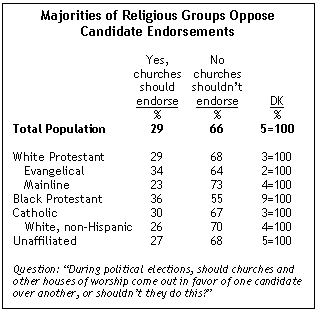On Sunday, Sept. 28, more than two dozen pastors challenged a provision in the tax code that restricts the political activities of houses of worship and other tax-exempt organizations. Arguing that they have a constitutional right to speak out on political issues, the pastors discussed the 2008 presidential candidates from the pulpit and, in some cases, endorsed a particular candidate. On Sept. 29, the church-state watchdog group Americans United for Separation of Church and State filed complaints with the Internal Revenue Service based on the political content of six of these sermons. The Alliance Defense Fund, the conservative legal-advocacy group that organized “Pulpit Freedom Sunday,” has said that if the IRS tries to penalize the houses of worship for their pastors’ political advocacy, it will bring a lawsuit challenging the constitutionality of these penalties.
Whatever the legal merits of the ADF’s protest and Americans United’s complaints, and regardless of the eventual outcome, many Americans clearly are uncomfortable with churches participating in partisan politics. While a strong majority of Americans support religion’s role in public life, a solid majority also expresses opposition to churches coming out in favor of particular political candidates. Indeed, an August 2008 survey conducted by the Pew Forum on Religion & Public Life and the Pew Research Center for the People & the Press shows that two-thirds (66%) of the public opposes churches and other houses of worship speaking out in favor of one candidate over another. The high level of opposition to such endorsements is consistent with Pew polling conducted in recent years.

Although Pew surveys often find major differences – both among religious traditions and among those with different levels of religious commitment – on other issues relating to religion and public life, there is widespread agreement on opposition to churches endorsing political candidates. For instance, among religious groups, white evangelical Protestants are nearly as opposed to such endorsements as are those who are unaffiliated with any particular religion (64% vs. 68%). Black Protestants register the lowest level of opposition, but even among this group, those who oppose such endorsements outnumber those who favor them by almost 20 percentage points (55% vs. 36%).

This strong opposition to church political endorsements also applies to people with different levels of religious commitment. For example, virtually the same level of opposition exists among those who say that religion is very important to them (66%) as among those who say religion is not too important or not at all important to them (69%).

Similarly, more than six-in-ten of those who attend religious services at least once a week oppose such services (63%), as do 69% of those who seldom or never attend services.
Photo credit: AP




